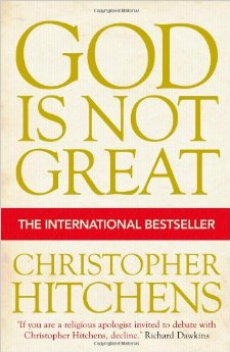
Email: reecejordan98@hotmail.co.uk
Total Article : 168
About Me:18-year-old sixth form student, studying English Literature, History and Government and Politics. My articles will broadly cover topics from the current affairs of politics to reviews of books and albums, as well as adding my own creative pieces, whether it be short fiction or general opinion.

Hitchens has already dealt one of his infamous Hitchslaps by the very title of his work. ‘God Is Not Great’ (the shortened version of the book, what proceeds is ‘How Religion Poisons Everything’) is an inversion of ‘Allāhu akbar’, which translates to ‘God is the greatest’. A brash title, then. And also inflammatory: so much so that, when touring and publicising the book, Hitchens was questioned on the need to provoke the Muslim faith from such a tarnish on what they term as sacred. His response was appropriate: after he outlined the sentiments as to why he believes God, should he exist, cannot be termed the ‘greatest’ he then goes on to debunk the notion that religion should hold some distinctive protection from criticism and derision.
So a big start. And that is pretty much the tone set for the rest of the book. Hitchens has positioned himself as one of the foremost outspoken atheists and critics of religion of the 21st century. His name is usually aligned with that of Richard Dawkins. Where he differs from Dawkins, however, is that he relies less on scientific explanations for why religious texts appear as conjurations of the imagination and more on the appeal to the rationale and common sense. One such example would be where explores the idea that our morality stems from our affiliation with Judeo-Christian values or whether we as humans have this innate sense of right and wrong. He forces us to question whether we believed that murder and theft were things of no moral consequence, had no effect on our conscience. He comes to the conclusion that of course we understood it to be wrong – “if we believed that murder and theft were all okay we wouldn’t have made it to Mount Sinai, or indeed anywhere else”.
Not only was Hitchens an astute rational thinker, but he also exhibited a fervent interest in history, and this also comes through on his analysis of religious text and practises of religious institutions. He covers the broad aspects of history, from questioning why God would choose to give his message in an illiterate heartland as opposed to the Asian where many could read and write, to the Catholic Church’s complicity in the Nazi regime with using such examples as the Concordat signed when Hitler came to power. What is one of the most interesting arguments put forward in the recollection of history, however, is a counter-argument against the notion that Soviet Union under Bolshevik rule was an example of an atheistic society, and that this in itself proves that such a society is not the utopia professed by atheists. Hitchens goes on to explain that the Bolsheviks were able to indoctrinate and seize power on the lines of a sort of pseudo-religion with their demigods and rituals. He argues that the Bolsheviks merely took advantage of a ‘well of incredulity’, something that is not symptomatic of a society that completely turns its face away from religion and the doctrine that goes with it.
Image Credits: amazon.co.uk

0 Comment:
Be the first one to comment on this article.